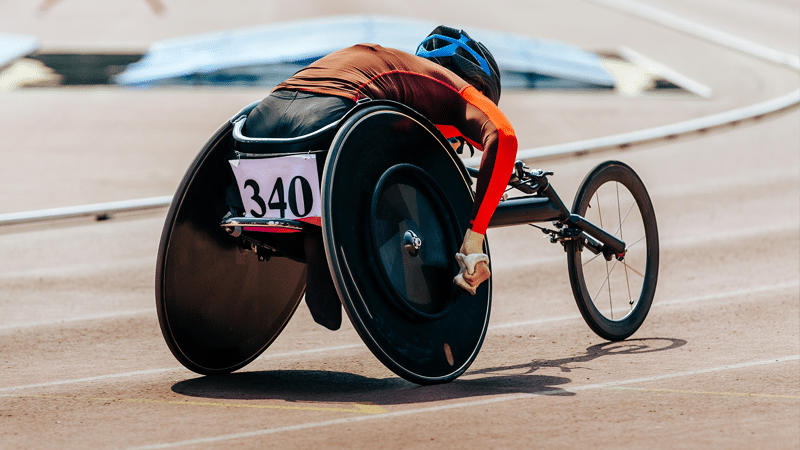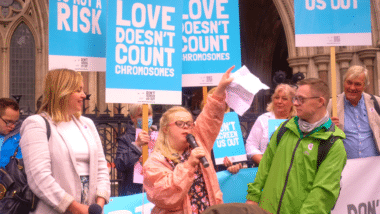Paralympic legacy: Will life lessons be learned?

For 16 years, Tanni Grey-Thompson was an almost unstoppable force in wheelchair racing. Eleven gold medals, four silver and one bronze across five Paralympic Games have made her one of the most authoritative voices in disability sport.
At the end of the Paris Games, she reflected on what lessons might be learned from another grand spectacle of sporting triumph over adversity: the legacy of purpose-built venues, transportation logistics, as well as ParalympicsGB’s team performance (they came second in the medal table behind China, with 49 golds, 44 silvers, and 31 bronzes).
She concluded that the success of the 2024 Paralympics will mean the movement has taken another step forward, and she hopes that Paris “perhaps will think a little differently about disability”.
That sentiment could easily be broadened to include any who chose to watch the Games. It should be plain for anyone to see that those competing have the same value as anyone else, no more, no less. At sporting events, there is a tendency for hyperbole, for commentators to wax lyrical about ‘superhuman’ feats of strength or speed. But in reality, we are all the same: all made equal, in the image of God.
Our differences in ability are not what gives us value, but the God who lovingly created each of us.
Assisted suicide
It’s a reality that is increasingly being recognised outside of Christian circles, and Baroness Grey-Thompson DBE DL, whose titles and appointments were awarded in recognition of her services to the disabled, has been arguing that point for some time.
In recent times, as a member of the House of Lords, she has spoken out against moves to introduce assisted suicide. Earlier this year, in response to widespread publicity of Dame Esther Rantzen’s campaign for the law to be changed, Lady Grey-Thompson said there are “really big consequences if you change the law and the relationship between an individual and society fundamentally changes”.
She said she is “really worried that disabled people, because of the cost of health and social care, because that’s being removed, that choice is then taken away so the only choice they have is to end their lives”, and added: “The consequences for people who don’t have a choice are really serious.”
Baroness Grey-Thompson won eleven gold medals, four silver and one bronze between 1988 and 2004.
And here lies the issue. The key argument from those wishing to change the law is that it should be a matter of autonomy, that it is all about ‘personal choice’. But Lady Grey-Thompson gets to the crux of the issue by pointing out that this is a matter of life and death, and that many people simply won’t have a choice. If assisted suicide or euthanasia are legalised, a tremendous burden will fall upon the shoulders of vulnerable people. Those living with long-term disabilities, whose care costs are high, will feel pressure to end their lives so as not to impose any sort of financial burden on their families.
Supposed safeguards provide little comfort either. Evidence from other jurisdictions to have legalised assisted suicide or euthanasia shows they have invariably widened eligibility criteria; in some cases until almost anything goes. Typically, it begins with adults with terminal illness who are expected to die within a certain time frame, say six months. (This ignores the wealth of testimony from doctors who say providing a prognosis is highly inexact, and that some people outlive their expected date of death by many years).
Then the need for a condition to be terminal is scrapped so that anyone experiencing what is deemed to be ‘unbearable suffering’ becomes eligible. This is particularly vague — who is to determine what is unbearable, the doctor or the patient? Later, it can also be extended to children who are deemed to have capacity to understand the consequences of the decision. And in some countries, even infants have become eligible, with their parents to decide if their suffering is likely to be ‘unbearable’.
Campaigners for assisted suicide are unlikely to mention infanticide as they fly the flag for personal autonomy, and they might deny it could ever be a possibility, but it has happened in the Netherlands. Child euthanasia is legal in Belgium. This is not merely hypothetical, these are highly probable future scenarios. And for the sake of the disabled, the elderly, the sick, and those with chronic conditions, we must oppose any attempt to liberalise the law.
Abortion
But of course, the Paralympics is also a reminder of the scale of people’s potential. Under UK law, most of the athletes who graced the track and field in Paris would have been eligible for abortion up to birth had their conditions been detected in utero. This includes Lady Grey-Thompson herself, who has shared her mother’s admission that had known she known about her daughter’s spina bifida, she probably would have aborted her.
Efforts have been made in recent years to amend abortion law so that it recognises that those with disabilities are no less deserving of life than anyone else. Campaigners have tried to bring the time limit for abortion on the basis of a disability in line with abortions for any other reason at 24 weeks.
But even this limited challenge to the current law by disability advocate Heidi Crowter, who has Down’s syndrome, failed at both the High Court and the Court of Appeal, while the Supreme Court, and more recently the European Court of Human Rights, have said they will not hear the case.
Heidi addressing her supporters outside of the Royal Courts of Justice in 2021.
Earlier this year, former Cabinet Minister Sir Liam Fox tabled an amendment to the Criminal Justice Bill to outlaw abortions for unborn children with Down’s syndrome after 24 weeks, but the Bill fell before the General Election.
Abortion, like assisted suicide and euthanasia is wrong. The Christian Institute has always campaigned for the sanctity of life to be recognised and upheld in our lands. We will keep doing so, and pray that the success of the Paralympics will prompt many people to change their views on people with disabilities, so that they might recognise their God-given value and worth.
“I praise you because I am fearfully and wonderfully made;
your works are wonderful, I know that full well.”
Psalm 139:14


